Beginner’s Guide: Paul Verhoeven, Director

Zac Hestand earned a BA in Film from the University…
Director Paul Verhoeven was born in Amsterdam, The Netherlands on July 18, 1938. He graduated with degrees in Math and Physics from the University of Leiden and later did military service with the Royal Dutch Navy. It was during his time in the Navy that he developed an interest in filmmaking.
Verhoeven made documentaries for the Navy, then later got involved in Dutch television in the 1960s. Television led to feature films in the 1970s, with many collaborations with actor Rutger Hauer. Unfortunately, these films are difficult to access, but his films from the 1980s onward aren’t. The later films gave audiences something different: American action sci-fi and thrillers with a European aesthetic.
To apply the auteur theory, there are certain characteristics found in a Verhoeven film. Traditionally, American films glorify violence but are rigid with sex, while European films are open with sex but are rigid with violence. Verhoeven blends the two: his films regularly show extreme graphic violence and nudity, but it is overdone for the purpose of satire. Paul Verhoeven makes dark, satirical comedies that comment on humanity’s obsession with violence and sex; all within genre films. To add on to that, these violent sexual comedies also examine the disproportionate gaps between social classes, with a hero that attempts to shatter the establishment.
The following films selected will cover the start of Verhoeven’s English language Hollywood movies and will end with his return to Europe. These selected films will show evidence of his recurring themes of class gaps and the use of graphic violence and sex to show humanity at their most primal, but in a humorous way.
Flesh + Blood (1985)
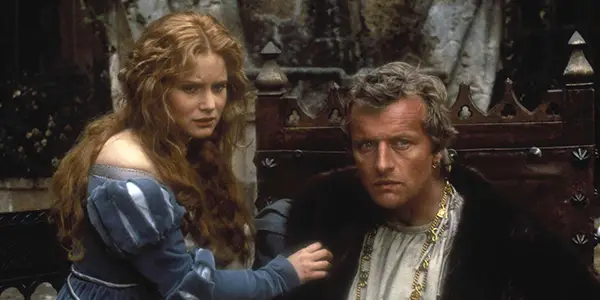
Paul Verhoeven’s first English language film, and final collaboration with Rutger Hauer, took audiences to Western Europe of 1501, where a group of mercenaries get scammed by their employer. Hauer and crew vow revenge by both planning to attack these trained soldiers and kidnapping the intended love interest (Jennifer Jason Leigh) of their employer’s son. What on paper sounds like a typical medieval adventure turns into something more in Verhoeven’s hands.
The film’s content lives up to its title, Flesh + Blood. It does not romanticize the period at all. It’s filled with combat in all its bloody glory (limbs are hacked off, impalements and other violent acts). This is our blood. The flesh is the rampant nudity and sexual assaults that occur in the aftermath of battles and overall lawlessness of the land. Flesh is the naked body, blood is violence, and when mixed together it makes a human at their most animalistic.
As with Verhoeven’s films, Hauer plays a hero from the bottom, a hired soldier, who fights the injustice committed by those on top. His peasant crew got cheated from these rich soldiers. While some at the bottom would accept their fate, Hauer and crew fight back with everything from swords, fire and bubonic plague infested blood to give viewers (pun intended) a bloody good time.
The film was not a financial success when released. However, Paul Verhoeven’s next film would not only be a financial success, but would further demonstrate a hero who rises to shatter the class gaps.
RoboCop (1987)
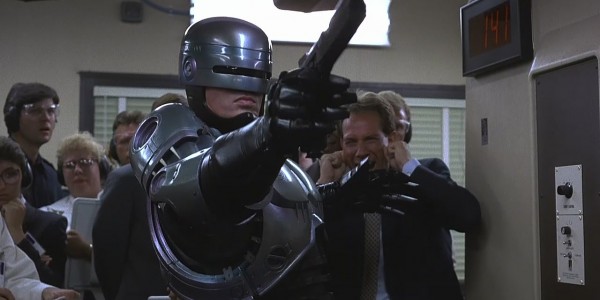
Detroit police officer Alex Murphy (Peter Weller) is gunned down in the line of duty, and his body is used to create the ultimate law enforcement officer in RoboCop. As the film progresses, he slowly begins to remember his previous life and seeks the truth of who or what he is, all the while uncovering the corruption within the powerful and omnipresent OCP organization.
With satire, the film pokes fun at 1980s greed and consumerism with its use of mock advertisements. The greed ties into the OCP organization, which basically controls the city of Detroit and gets rich from it. The huge wealth gap is shown by juxtaposing the OCP (who live like 1980s Wall Street yuppies) and the regular Detroit citizens that live below the poverty line. Satire continues beyond the excessive greed and shows America’s obsession with guns, violence, and sex (lots of barely clad ladies in the iconic “I’d buy that for a dollar” mock ads).
Outside of this satire of corporate greed stands our Verhoeven hero, RoboCop. He, as someone on the outside, goes up against the OCP to fight for the regular citizens of Detroit that he has sworn to protect. He ultimately overthrows the true criminals, giving Detroit a hopefully brighter future.
Total Recall (1990)
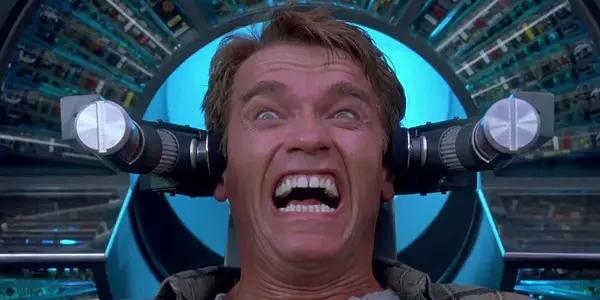
Paul Verhoeven made another sci-fi masterwork with Total Recall, based on the Philip K. Dick short story We Can Remember It For You Wholesale. A man goes to Mars when he learns his memories are false, and must figure out who he really is. The Philip K. Dick story proved to be a good match for Verhoeven, as both men wrote on themes of powerful organizations and the characters that try to break free.
In Dick’s prose, characters are suspicious that they’re being watched, followed or that a large conspiracy is behind a certain problem. There is a distrust toward the governing body or whoever is in a position of authority. The protagonist fights the system. Verhoeven uses Dick’s paranoia toward authority and merges it with his theme of inequality of classes. With this film, it’s between the mutant citizens of Mars and the Totalitarian colonists.
Like other films, the violence is bloody and the humor comes in the form of Arnold Schwarzenegger one-liners. Ronny Cox, again playing the villain like in RoboCop, dies in a hilariously over-the-top violent fashion, continuing in the dark comedy tradition of these films.
After the completion of this film, Paul Verhoeven finally left the sci-fi and historical genre to make a movie, a thriller, in a contemporary setting.
Basic Instinct (1992)
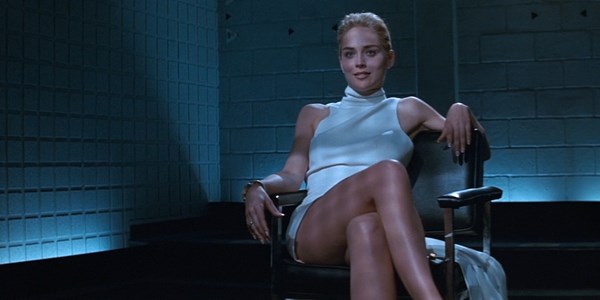
Set in San Francisco, a troubled detective (Michael Douglas) is tasked to solve the murder of a celebrity. The main suspect is Catherine Tramell (Sharon Stone), a crime novelist romantically linked to the victim. Unfortunately for Douglas, Tramell is both a celebrity and a very clever and manipulative individual.
The humor in this film lies in the portrayal of sexuality creating both discomfort and control. Mainstream American movies did not usually portray sex in this manner, well, not without a little bit of controversy. Tramell is comfortable in her own skin, and that makes the men around her both awkward and under her control. For Douglas, his attraction grows into an obsession, to the point that his professional and personal life begin to spiral out of control.
Eroticism aside, in looking at inequality, we see this in the use of celebrities and the law. Some celebrities do illegal activities but only receive a light sentence compared to non-celebrities. It is not fair; the punishment should fit the crime, as they say. As a law enforcement official, Douglas seeks justice, and knows in his gut that Tramell must be guilty.
Showgirls (1995)
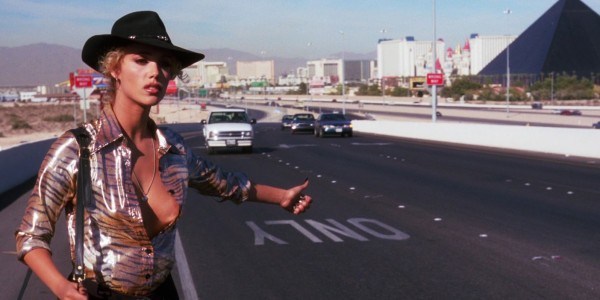
A critical and box office bomb at its time of release, and a film that killed the career of Elizabeth Berkley and the idea of a mainstream NC-17 movie. Like all art, whether it is music or literature, the passage of time is a funny thing. Through reevaluation, work that got dismissed at the time have become classics (It’s a Wonderful Life flopped in its original release and is now an iconic Christmas movie) while some praised in their time have lost relevance or diminished in status (Gone With the Wind is a bit of a problematic film these days). Showgirls falls in the former category.
Reevaluation has shown that Showgirls is a satire on show business and the ridiculousness of celebrity worship. The actors give over-the-top, diva level performances and go through absurd, illogical lengths to get what they want. Berkley is a small town girl that dreams of making it big as a dancer. She would hurt and attack anyone to headline a topless show in Las Vegas.
The humor is the Verhoeven touch, he shows how obsessed people become to achieve their dreams, and how greedy. Greed recurs frequently here with excessive parties and clubbing, much on par with RoboCop. With show business, Verhoeven uses the celebrity world as his inequality gap and Berkley as a, well, anti-hero to break down the system.
While originally a failure, the passage of time through DVD viewings and midnight screenings turned the film into a misunderstood cult classic. After completing this film, Paul Verhoeven returned to sci-fi and made another misunderstood cult classic.
Starship Troopers (1997)
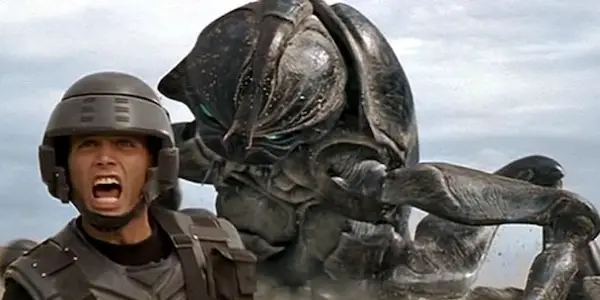
At first glance, Starship Troopers looks like a generic giant alien bug shoot ’em up movie, but it’s not. Like RoboCop and Showgirls, the film is a satire. RoboCop focused on greed and consumerism, Showgirls on celebrity and greed, while Starship Troopers pokes fun at extreme patriotism and violence. The movie even contains phony commercials like in Robocop.
In this futuristic world, to become a citizen, you must do military service. Citizenship is not a birthright, but a duty for the country. Commercials and various propaganda fill the movie to encourage people to join up, become a citizen, and defend the earth from giant alien bugs. Defend it in all of its bloody glory.
In battle sequences bugs explode, humans get decapitated, and even the training is intense. Prior to joining the service, our hero Johnny Rico (Casper Van Dien) is a high school football star with hopes to become a citizen. There is a scene that shows a football game, and it’s more extreme to what passes for the NFL. Violence equals power in this world.
Unlike the other films, there is no central villain. The bugs are the closest thing to a villain present in this movie. The inequality between the military and civilians is clear, but it’s no threat. Van Dien becomes our Verhoeven hero by portraying a lowly grunt, who takes charge to save the world from a powerful alien force.
Black Book (2006)
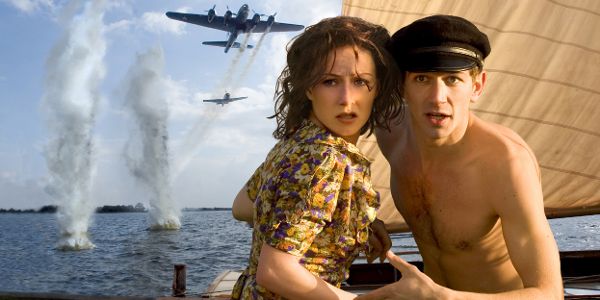
With this film, Paul Verhoeven left Hollywood and returned to make a film in his native country for the first time in over two decades. As with Flesh + Blood, he went back to the past to tell a WWII story about the Dutch resistance. The film is in his native Dutch and his homeland, but still shares many characteristics of his Hollywood material.
Black Book tells the story of Rachel Stein, a Jewish singer who joins the resistance and is assigned to work as a spy. She goes undercover as a Nazi to seduce Ludwig Muntze, a high ranking official, in order to free the son of a resistance member and to get information from Muntze. What unfolds is a tale of intrigue, espionage, and adventure.
Unlike many of his films, the satire is absent here, but the inequality is not. The Nazis are obviously the oppressive higher class, while the Jews and members of the Dutch resistance are the lower level. Rachel Stein, as a Jew, faces oppression along with other resistance members, and fights to bring down the Nazis.
Paul Verhoeven: Final Thoughts
Paul Verhoeven is approaching 80 years and shows no sign of slowing down. He can soon be a member of the octogenarian director’s club that includes Clint Eastwood and Woody Allen, to name a few members. Eastwood and Allen continue to make new films and try new things, and Verhoeven is no different.
Last year, he made his French language debut with Elle. The film received international acclaim and earned the lead a Best Actress Oscar nomination. His next film will also be a French language film entitled Blessed Virgin about 17th century lesbian nuns.
Even at almost 80 years old, Paul Verhoeven continues to entertain, provoke, and offer commentary with violent sexually-charged dark comedies. I don’t know about you, but I eagerly anticipate any work with his name attached to it.
Do you agree with the themes of these films? Is there a film I left out that you wished I included? Please leave a comment below.
Does content like this matter to you?
Become a Member and support film journalism. Unlock access to all of Film Inquiry`s great articles. Join a community of like-minded readers who are passionate about cinema - get access to our private members Network, give back to independent filmmakers, and more.
Zac Hestand earned a BA in Film from the University of Nevada Las Vegas, and MA in English from the University of Sheffield. He is currently at work on his first book.












